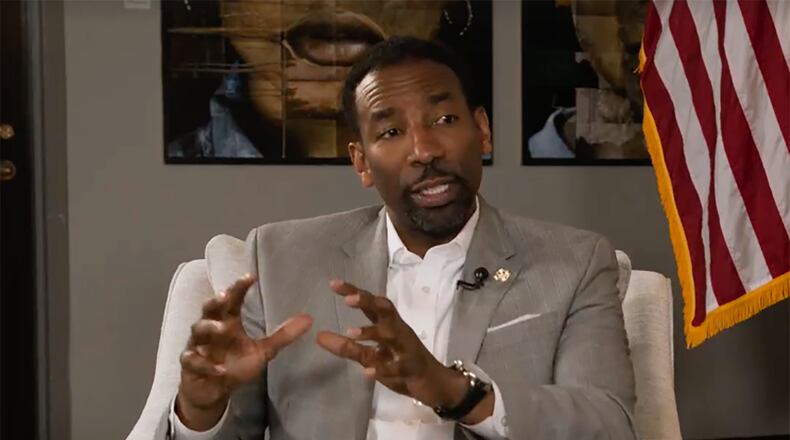During his second State of the City address, Atlanta Mayor Andre Dickens called on community leaders to continue furthering the city’s legacy by supporting young Atlantans.
Early Tuesday morning, a crowd of hundreds — including current and former elected officials — greeted each other in a decked out ballroom at the Marriott Marquis in downtown Atlanta for the mayor’s second annual speech.
This year, Dickens’ grand entrance to the event was reminiscent of a New Orleans second line as he made his way through the crowd accompanied by the brass band from his alma mater, Benjamin E. Mays High School.
Dickens said his young ushers, the harpists outside the ballroom doors, and Atlanta Music Project who sang the National Anthem are all a reminder of the responsibility to cultivate young residents who eventually grow into the city’s leaders.
“I was once like them: a child of Atlanta,” Dickens said. “The leaders who came before me left their mark on this city. I am living proof of their legacy. I’m standing here because of the city they built.”
Dickens described being mayor as “a tough job” but touted during his speech successes like the city’s strong financial status, declining rates of violent crime, and a thwarted Buckhead secession movement that would have split the city in two.
“I have never been more excited about Atlanta’s progress,” he said. “I have never been more optimistic about Atlanta’s opportunities and I’ve never been more thankful to the people who are investing in our city’s future.”
The mayor highlighted his administration’s focus on bolstering public safety by programs like take-home vehicles for police and pay increases for first responders.
Despite significant local and national controversy surrounding the planned public safety training center in DeKalb County, Dickens again stood steadfast in his position to move the project forward.
“We need more than paychecks and vehicles to support our public safety personnel,” he said. “We need training facilities and our police and fire training centers have been long condemned.”
Atlanta voters OK’d $750 million at the ballot box last year to rebuild infrastructure. Later this week, the city will break ground on the first Moving Atlanta Forward project: the Center for Diversion and Services that will serve residents struggling with poverty.
Concerns around affordable housing dominate conversation both inside and outside City Hall. Dickens announced Tuesday that the city is creating a pilot program to freeze property taxes for 100 lower-income seniors for the next 20 years.
The mayor also gave an update on the city’s lofty goal to build or preserve 20,000 affordable housing units by 2030. Atlanta has developed more than 1,900 units, with 5,400 currently underway.
“We’re serious about this,” he said. “So serious, as a matter of fact, that we just bought a skyscraper in Downtown Atlanta and are now in the process of converting it into what will become the tallest residential building in Atlanta with hundreds of affordable housing units.”
Dickens is still fresh into his first term.
Speakers recalled his long shot bid for mayor in 2021 where he surprised many by qualifying for the runoff by edging former mayor Kasim Reed, then winning the office by soundly defeating former council president Felicia Moore. The then-city council member went on to become the 61st mayor — winning with the largest margin for an open mayor’s race since 1993.
“The truth is, then candidate Dickens connected with Atlanta,” said Colin Connelly, president of Cousins Properties and chairman of the Atlanta Committee for Progress.
Attendees got to travel even farther back in Dickens’ life and shared a laugh at a video featuring childhood photos.
“He pushed himself, which was great for me, that made my job easier,” Sylvia Dickens, his mother, said in a video.
The mayor coined this year the “Year of the Youth” to promote initiatives that focus on cultivating the next generation of Atlantans. He announced programs like Midnight Basketball will continue through 2023.
Atlanta Public Schools Superintendent Dr. Lisa Herring said the effort to support students is “mission possible and mission critical.”
“My point is the work we are doing collectively has a moral imperative attached to it, and it is a moral imperative,” Herring said.
The event also highlighted Dickens’ collaborative relationship with Atlanta business leaders.
Coca-Cola CEO James Quincey announced a $1.7 million grant for Atlanta’s youth-serving organizations APS, the United Way of Greater Atlanta, the Boys and Girls Club of Metro Atlanta, the city’s Early Childhood Initiative and Morris Brown College.
Activists voice concern
Next door to the pomp and circumstance, community organizers gathered in a conference room to say the city’s progress isn’t as positive as Dickens painted.
Advocates raised concerns about the training center, domestic terrorism charges levied against training center protesters, and inmates housed at the Atlanta City Detention Center, among other issues.
Kamau Franklin, founder of the Community Movement Builders, argued that Atlanta is struggling with gentrification as corporations dictate the operations of city government.
Devin Franklin, from Southern Center for Human Rights, criticized Dickens for leasing beds at the detention center to Fulton County, even though Dickens sponsored legislation creating the task force that urged the city to turn it into an “equity center.”
Marlon Kautz with Atlanta Solidarity Fund said they’ve witnessed law enforcement hindering the right to protest, be it in the forest or elsewhere.
Toni-Michelle Williams, Executive Director of the Solutions Not Punishment Collaborative, urged public leaders to do more to protect the young LGBTQ+ people of color who are often at risk of being harassed by police.
“What we want Mayor Dickens and the Atlanta city council to know is that the state of the city that we live in, is in shambles and it’s because of your missed leadership,” said Rev. Keyanna Jones, an interfaith leader from DeKalb County.
Keep Reading
The Latest
Featured




